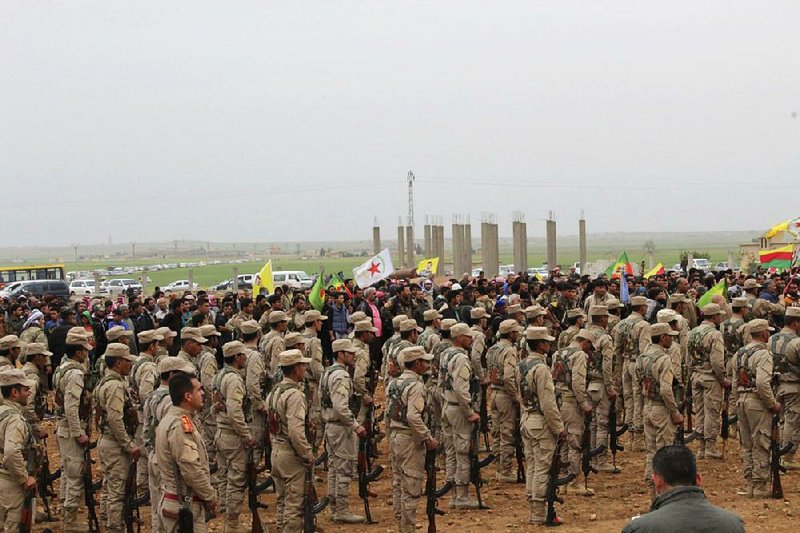BEIRUT -- A misdirected airstrike by the U.S.-led coalition this week killed 18 allied fighters battling the Islamic State group in northern Syria, the U.S. military said Thursday.
U.S. Central Command said coalition aircraft were given the wrong coordinates by their partner forces, the predominantly Kurdish Syrian Democratic Forces, for the strike Tuesday that was intended to target Islamic State militants south of their Tabqa stronghold, near the extremists' declared capital, Raqqa. The strike hit a Democratic Forces position instead.
"The coalition's deepest condolences go out to the members of the SDF and their families. The coalition is in close contact with our SDF partners who have expressed a strong desire to remain focused on the fight against ISIS despite this tragic incident," Central Command said in a statement. "The coalition is assessing the cause of the incident and will implement appropriate safeguards to prevent similar incidents in the future."
Several nations have lent their air power to the U.S.-led coalition to defeat the Islamic State, and it wasn't clear which air force was behind the errant strike.
The Democratic Forces acknowledged the strike, saying a number of its fighters were killed and wounded. On Thursday, the group held funerals for 17 of its fighters in the border town of Tal al-Abyad, the Democratic Forces-linked Hawar news agency said, though it did not say whether they were killed in the misdirected strike.
An activist-run group, Raqqa is Being Slaughtered Silently, said three days of mourning had been declared for the town. The Britain-based Syrian Observatory for Human Rights said 25 Democratic Forces fighters were killed in the past two days of battle.
The Democratic Forces, meanwhile, announced the beginning of a new phase of its campaign to retake Raqqa. The Kurdish fighters, with U.S.-led air and ground support, have surrounded Tabqa, some 25 miles southwest of the city and are working to clear Islamic State militants out of Jalab Valley, north of Raqqa.
The Democratic Forces says it wants to isolate Raqqa before attacking it. Its closest position is less than 5 miles northeast of the city. But the countryside south of Raqqa is still under Islamic State control.
It is not clear how many friendly-fire strikes have happened since the campaign began against Islamic State in Iraq and Syria in 2014.
The coalition releases monthly reports of civilian casualties from airstrikes, both those confirmed and under investigation. But friendly-fire strikes are tracked internally, said U.S. Army Col. Joe Scrocca, a Baghdad-based spokesman for the coalition.
"The coalition takes each of these incidents very seriously but we do not keep cumulative data on them like we do civilian casualties because they happen so infrequently," he said.
The London-based monitoring group Airwars, which works with the coalition to track airstrike casualties, has found 37 reported friendly-fire strikes in Iraq and Syria since 2014.
Four had been confirmed by the coalition, including the one in Tabqa, according to Airwars director Chris Wood.
"It's very difficult to know how many more friendly-fire events there have been since the coalition does not disclose this information," Woods said.
Scrocca said he was "not aware of those incidents; we do not keep cumulative data on them, so I cannot readily verify their validity."
Woods said it's difficult to track total casualties from the strikes, and their estimates vary widely.
More have been reported in Iraq, where there have been 224 to 419 suspected friendly-fire casualties from coalition strikes, than in Syria, where there have been 35 to 86, he said. Woods said part of the reason the estimates vary so much is that it's not clear who the coalition considers combatants.
Meanwhile, preparations were underway for the planned evacuation of more than 10,000 residents from two pro-government Shiite villages in northern Syria, Foua and Kfarya, and the rebel-held towns of Madaya and Zabadani near Damascus.
Dozens of buses entered the areas Wednesday but by late Thursday people had not boarded them, according to opposition activists in the rebel-held towns.
If the evacuations go through, they would be the first in number of rounds stretching over two months to evacuate some 30,000 Syrians from besieged areas, in a deal struck by rebels and the government. It is unclear whether they will ever be able to return to their homes.
Civilians are being given the option to stay, but activists and doctors said it's too dangerous for medical workers to do so. Since the beginning of the conflict, the government has targeted medical workers with detention, torture, and bombardment.
Information for this article was contributed by Philip Issa, Bassem Mroue, Sylvia Hui and Vladimir Isachenkov of The Associated Press and by Molly Hennessy-Fiske of the Los Angeles Times.
A Section on 04/14/2017

